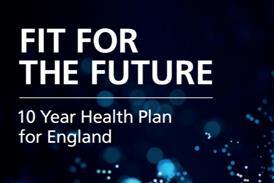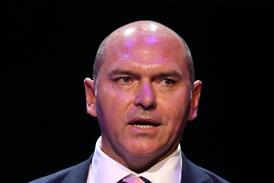- NHS now faces “much more performance management-orientated world”, warns Sir Jim Mackey
- Elective chief says it could take until spring 2023 to fully understand how much of pandemic’s missing demand could return
- Defends appointing management consultants to support ICSs with recovery plans
- Warns leaders should “worry about” public perception of service
Trust leaders now face a far more ‘performance management-orientated world’ than most have realised, following a prolonged period in which there has been little grip from regulators, Sir Jim Mackey has warned.
Speaking exclusively to HSJ, the NHS England elective chief also revealed system leaders think it could take until next spring to fully understand how much of the missing demand from the pandemic period will return and require care.
In a wide-ranging interview following publication of NHSE’s elective recovery plan last week, Sir Jim also defended the decision to appoint management consultants to support integrated care systems with elective recovery plans, and acknowledged NHS leaders should “worry about” public perception of the service.
Addressing the performance management environment facing the service in the coming years, he said “huge investment” from government meant increased scrutiny from both the public and ministers.
He said: “Because everything’s in transit with us moving towards ICSs, we’ve been quite pragmatic about [performance standards] from an NHSE perspective, but we’re now going into a much more accountable, performance management-orientated world than I think most people have clocked.
“If we are honest, we’d been drifting for a few years before covid on the key metrics. We’ve had a couple of years where, for understandable reasons, there hasn’t been quite as tight a focus on some of these things. But there will be.”
He said a greater focus on performance management does not mean “it needs to be shouty, or unprofessional, or disrespectful… But we have to get this delivered”.
“We have got to pull together and deliver this for the public and for our staff… We need to make sure that accountability is as visible with the public as is humanly possible,” he added.
His comments follow backlash from some sections of the media, including the Daily Mail, while some Conservative MPs have criticised the plan for not being ambitious enough.
Many political commentators also believe the NHS waiting list will be a major feature of campaigning around the next general election, likely to be in 2024.
The main targets, which were subject to prolonged wranglings between ministers and NHS leaders, include the service committing to eliminating all two-year waitiers by July and 52-week waiters by March 2025.
Scale of challenge still ‘impossible to predict’
Sir Jim, who is also Northumbria Healthcare Foundation Trust chief executive, added it was still “impossible to predict” how much elective demand the system would face over the coming years.
The new targets set out in last week’s plan are predicated on an assumption that “around half” the 10 million referrals which were expected but did not present during covid do end up being referred.
With this missing demand cohort conceivably representing an additional burden over half the size of the current 6 million patients on the list, any shift to such a large proportion could have a seismic impact on the NHS’s chances of hitting targets set in the recovery plan, and the timing could be critical for general election campaigns.
Sir Jim said the existence of “such a big unknown” was why the NHS had not been able to commit to more “precise” targets, but he said system leaders should have a better idea by “between the autumn and spring 2023, assuming we have a relatively clean run and don’t have another big covid wave”.
He added: “If it becomes apparent that we have massively over-estimated the problem, I don’t think we’ll tear up the plan. I just think we’ll be under massive pressure to accelerate it, especially with the understandable political and public focus we can expect.
“If it turns out being a lot worse, government has been reasonable with the impact of Omicron, and we will clearly need to agree how we handle this at the time.”
‘We should worry about public perception’
Asked about the criticism that recovery targets were not ambitious enough, Sir Jim said he understood the frustrations with long waits, but it was a case of being realistic. The targets were stretching and would require a “long slog” to be met, he said.
“I would love us to return to normal, completely acceptable waiting times more quickly. The NHS has had its biggest ever shock, and it’s not over yet. We cannot forget that,” he said.
The former NHS Improvement boss also raised concerns about public perception shifting against the service.
He said: “I think we should worry about it [the public’s perception]. Some polling a couple of weeks ago showed the public’s satisfaction with the NHS had taken a bit of a hit nationally. I think it’s completely understandable, that if you’ve waited a long time, and then you’re being told you’re going to have to wait quite a long time extra, you’re going to start to get grumpy about that.
“To be honest, it’s not an unhealthy thing. We are accountable to the public and that can help spur us on to help us with recovery.
“We want to get more serious about patient satisfaction and create more ways of measuring and acting upon that.”
‘Pragmatic’ £42m management consultancy deal was ‘my fault’
On the controversial decision to pay between £21m and £42m to management consultants for work “supporting” ICSs with their elective recovery plans, Sir Jim said it had been his decision.
He said: “It was my fault,” adding it had felt “unreasonable” to ask organisations which do not even legally exist yet to produce robust plans while they were still “in transition” and appointing key roles.
He added: “It sounds like a load of money, but for half a million each, to get some people to work alongside the ICSs to develop the best plans we can, so we don’t have to wait another three or four months while the new teams do them, felt like a pragmatic way of saying ‘can we just make sure there’s some support in the systems to get some decent plans’, but while recognising these things are still being built.”
For more analysis, including Sir Jim’s views on a new financial regime, and why there was not a big target for patient initiated follow ups, see this week’s Recovery Watch.
Source
HSJ interview
Source Date
February 2022



























27 Readers' comments